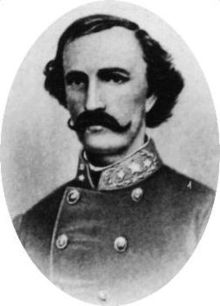Thomas James Churchill
Thomas James Churchill (born March 10, 1824 in Louisville , Kentucky , † May 14, 1905 in Little Rock , Arkansas ) was an American politician and major general in the Confederate Army .
Early years
Churchill was born near Louisville, Kentucky. He attended St. Mary's College and then studied law at Transylvania University . In the Mexican-American War he served with the rank of lieutenant in a regiment of the Mounted Infantry . He was captured by the Mexicans and imprisoned until the end of the war. After his release he moved to Little Rock and a little later married the daughter of Senator Ambrose Sevier and ran a plantation.
Civil war activities
When the Civil War broke out, Churchill joined the Confederate Army and was appointed commander of the First Arkansas Mounted Rifles . He was involved in the first fighting on August 10, 1861 at the Battle of Wilsons Creek in Missouri . After the Battle of Pea Ridge he was promoted to brigadier general in March 1862 and soon after took part in General Kirby Smith's Confederate "Heartland" offensive and played an important role in the victory of Richmond , Kentucky. In the fall of 1862, Churchill was summoned to the Arkansas Post to secure this important point, and had Fort Hindman, named after Thomas Carmichael Hindman , built there. In January 1863 the fort was attacked and taken by overpowering Union troops under Major General John McClernand. After his release as part of a prisoner exchange, Churchill was reassigned to the Trans-Mississippi Military Area and again subordinated to Kirby Smith. He was given command of an infantry division . With this he took part in the Red River campaign and the Battle of Jenkins Ferry. Shortly before the end of the war in 1865, he was promoted to major general.
Arkansas Governor
After the war, Churchill was Arkansas Secretary of the Treasury from 1874 to 1880. On September 6, 1880, he was elected as the Democratic Party candidate for the new governor of Arkansas. On January 11, 1881 he was able to take up his new office. During his two-year tenure, new laws in the field of health were passed and a health committee was established ( State board of health ). Arkansas Industrial University also received a medical school. Funds were made available for a home for the mentally handicapped and for the construction of a new school in Pine Bluff. Soon there were rumors and allegations that Churchill had embezzled money while serving as Treasury Secretary of Arkansas. The state parliament set up a committee of inquiry which confirmed the allegations. Churchill was sentenced to repay the missing funds. The sum was over $ 233,000 according to the second investigation report, of which Churchill repaid about 23,000. But he has not officially pleaded guilty. The last few months of his tenure were overshadowed by this case.
Another résumé
After the end of his tenure on January 9, 1883, Churchill withdrew from public life. He died in Little Rock in March 1905 and was buried there with military honors.
See also
literature
- David J. Eicher: The Civil War in Books: An Analytical Bibliography. University of Illinois, 1997, ISBN 0-252-02273-4
- Richard N. Current: Encyclopedia of the Confederacy. 4 volumes, 1993 ISBN 0-13-275991-8
- John H. Eicher and David J. Eicher: Civil War High Commands. Stanford University Press 2001, ISBN 0-8047-3641-3
- Ezra J. Warner: Generals in Gray: Lives of the Confederate Commanders. Louisiana State University Press 1959, ISBN 0-8071-0823-5
Web links
- Thomas Churchill in the National Governors Association (English)
- Arkansas Encyclopedia (English)
- Online biography of Governors of Arkansas (English)
- Thomas James Churchill in the database of Find a Grave (English)
| personal data | |
|---|---|
| SURNAME | Churchill, Thomas James |
| BRIEF DESCRIPTION | American politician, governor, major general in the Confederate Army |
| DATE OF BIRTH | March 10, 1824 |
| PLACE OF BIRTH | near Louisville , Kentucky |
| DATE OF DEATH | May 14, 1905 |
| Place of death | Little Rock , Arkansas |

